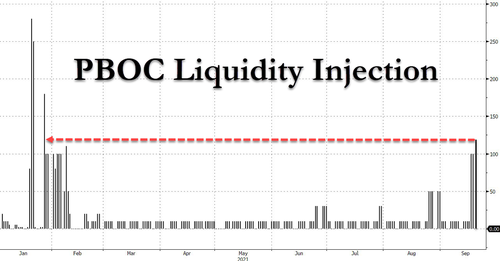After two anxiety-filled days during which China was on holiday and traders hammered Hong Kong trader property stocks, contagion fears arising from China Evergrande Group's debt crisis moderated overnight with mainland stocks declining less than expected on Wednesday as they resumed trading, after Evergrande's onshore unit unveiled vaguely worded plans to pay interest due Thursday on a yuan bond, while leaving the fate of a $83.5 million offshore bond coupon payment in limbo.
As we noted earlier, in its filing to the Shenzhen Stock Exchange, the Evergrande unit said that it reached an agreement with yuan bondholders on an interest payment due Sept. 23. It, "has been resolved via negotiations off the clearing house," but didn't specify how much or when it will pay the 232m yuan coupon at stake.
The language is potentially ominous because under normal circumstances, Chinese bond issuers would simply transfer money to a clearing house to complete payments. The "off-the-clearing house" approach usually means direct but delayed, or partial payment to bondholders. There could even be a lower interest rate involved. In short: it's one way to avoid being called a defaulter.
As Bloomberg's Shen Hong wrote, "Evergrande may have secured bondholders' agreement with a payment extension or at least succeeded in asking them not to act until compromise is reached, even as it misses the payment due Thursday."
In any case, the notice coupled with a 120 billion liquidity injection by the PBOC, the largest since January, and sparking hope that Beijing won't leave the property market in turmoil...

... ushered in relief across markets, with China's CSI 300 Index trimming losses to just 0.7% as of the mid-day lunch break after falling as much as 1.9% at open. Market participants said the development could provide support to stocks battered by regulatory worries, with an injection of short-term cash by the People's Bank of China also boosting sentiment.
In any case, as the sampling of Wall Street reactions to the Evegrande announcement courtesy of Bloomberg shows, responses ranged from the cheerfully optimistic to the downright pragmatic, with some predicting this is the end of the Evergrande drama while others speculating that it is only just starting.
Liu Xiaodong, fund manager at Shanghai Power Asset Management Co.
"There is evidently a large disparity between what onshore stock investors make of the Evergrande risks and the broader pessimism offshore. I agree with local investors that Evergrande ultimately will not be a systemic risk, and authorities will take action to prevent it from being one, and this difference in attitudes stems from different read of the government need to get involved in risk containment."
"However I don't think the news today changes much and I won't be trading much on company headlines since I believe that it will not be systemic and will only affect property and companies in the supply chain."
Jun Rong Yeap, market strategist at IG Asia Pte.
"I think we may be seeing a temporary reprieve with some repayments aiding to provide a better-than-expected situation than many would expect. This also comes along with some injection of short-term funds by the PBOC, which suggests that they are monitoring the situation closely and are ready to step in if the economy comes under risks."
Kelvin Wong, analyst at CMC Markets (Singapore) Pte.:
Short-term traders or investors that use momentum-driven quantitative strategies "are likely to initiate long positions for a potential mean reversion rebound play plus risk/reward ratio of such trading strategies are attractive at this level," he said.
The Evergrande coupon news "has added another layer of positive feedback loop in terms of short-term sentiment that is likely to prevent the CSI 300 from a much more pronounced decline," after the Hang Seng Property Index went into oversold territory this week.
Gary Dugan, chief executive officer at the Global CIO Office:
Evergrande news "will be helpful and hopefully suppress some of the inevitable volatility and downside after the holiday break. That said for confidence to return more meaningfully will need the market to see sight of the broad restructuring plans for Evergrande."
Thomas Westwater and Daniel Dubrovsky, analyst and strategist at DailyFX:
"A liquidity injection from the People's Bank of China accompanied the Evergrande announcement, which only served to bolster sentiment further," Westwater and Dubrovsky wrote in a note. "Chinese policymakers stopped short of cutting 1- and 5-year loan prime rates, however. For now, it appears that market-wide contagion risk linked to a potential Evergrande collapse is off the table."
James Sullivan, head of Asia Pacific equity research at JPMorgan Chase & Co. told Bloomberg Television:
"Evergrande is still likely to default. This is not a company specific issue, this is a structural issue that will impact the entirety of the Chinese developer space but this will not become systemic. We see potential buying opportunities in less leveraged developers with lower inventory levels but we do not see this as a contagion risk for the rest of the region at all."
Commenti
Posta un commento